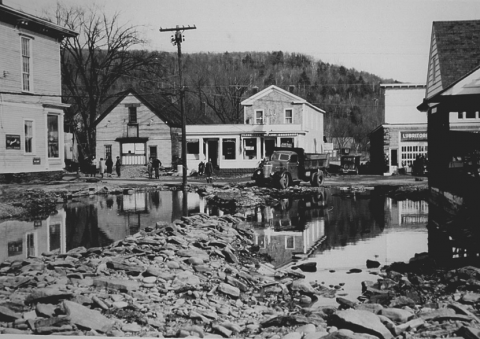
Ellen Verni has been writing "Home Cookin'," her column of Catskills recipes and rumination, for 24 years. She is sharing some of her archived columns with the Watershed Post. You can get more of Verni on her blog, at homecookincolumn.blogspot.com.
In a reminder that devastating flooding has hit the Catskills before, we're running a column that Verni wrote on January 24, 1996, a week after floodwaters innundated the town of Middletown and the village of Margarteville in Delaware County. At the time, Verni was working at the Catskill Mountain News, the offices of which were damaged by floodwaters. Above is a photo of damage in Margaretville caused by yet another flood, one that hit Margaretville in 1950-51. That photo is from the Delaware County New York Genealogy and History website, and was taken by Donnie Kelly.
Standing on Main Street looking down toward what used to be Bridge Street on Saturday morning my first thought was that this isn’t supposed to happen to people like us. We’re good people. We work, we pray, we obey the rules. We go about our business. We watch and read the news and tsk tsk at the plight of the homeless and unemployed, the despair of those on welfare and the suffering of the people in Bosnia. But then our world turns on a dime, grabs us by the seat of our pants right out of our comfy chair in front of the TV and places us in tomorrow’s telecast. And now someone else is tsk tsking at our condition, our misfortune.
When I had just graduated from college and was out on my own, absorbing the first knocks from life, I made up a sign and placed it on my wall so that the first thing I saw in the morning and the last thing I saw at night were these words, “Nothing lasts forever.” I still have that sign, although I have added to it over the years. It has kept me from becoming too complacent and has helped me keep things in relative perspective.
After the rains subsided I assessed my situation and found myself to be very fortunate. My home was high and dry, my only loss was access to the road, which was easily enough corrected gratefully with the help of a volunteer crew from Shinhopple. My place of work was another story.
Saturday morning was spent attempting to get to my office, first pleading with, then arguing with, firemen and troopers that I must be allowed into town. And that’s when it hit me; I hadn’t lost material things, I had lost something more tangible to me: my freedom, my mobility. And so when I finally reached Main Street I felt deeply for the business people pacing at the police barricade who were being denied access to their shops. Not only had they lost merchandise and a means of livelihood, they had also lost their freedom.
The News office sustained considerable water damage and like others I had lost “important” papers. You know what I mean; stuff we could never get rid of, but then as we’re tossing dripping wads of it into a dumpster we wonder how we could have attached such importance to it at all. A premature spring cleaning was forced upon us. Things take on a entirely new importance or lack thereof. “I’ve been meaning to clean out that basement; that truck backing up on my driveway is just not important; that argument I had with my neighbor is immaterial.”
Standing among the small group gazing down Bridge Street I also thought that this destruction, where once stood shops and markets, shoppers and townsfolk, looked oddly familiar to me. Yes this scene might very well be in Bosnia. Actually it was like a good day in Bosnia: there was no shelling, no rocket fire. Opposite sides of the globe and we’re both looking to a new day, a new beginning.
For us, daybreak had brought receding waters and a beautiful spring like day. The cleanup had begun. and this is the beautiful part; the part of the story where the community comes together to help each other; the volunteer firemen seeing to furnaces and gas tanks, the auxiliaries preparing and serving sustenance, the volunteers from throughout the state bringing trucks and backhoes to repair the roads and bridges.
It seems that nature makes examples of us at times, forcibly humbles us, makes us put our lives in perspective, and shows us what is truly important, and that is home and community, and each other.
As Robert Frost once said, “Nature does not complete things. She is chaotic. Man must finish, and he does so by making a garden and building a wall.”
Come Together Chicken Soup with Dumplings
- 1 1/2 quarts chicken broth
- 2 cups diced cooked chicken
- 1/4 cup flour
- 1/2 teaspoon salt
- 1/4 teaspoon nutmeg
- 1 tablespoon sugar
- 2 tablespoons butter or margarine
- 1 egg, beaten
- 8 blanched almonds, minced
- 2 sprigs parsley, minced
Bring broth and chicken to a boil in a large pot. To make dumplings, in saucepan, blend flour and a little milk to a paste. Add remaining milk, salt, nutmeg and sugar. Cook until thickened, stirring constantly. Add butter and stir until melted. Pour over egg; mix, and cool. Add almonds and parsley. Drop by spoonfuls into gently boiling soup. Cook 2 minutes or until dumplings rise to the top. Serves 4











